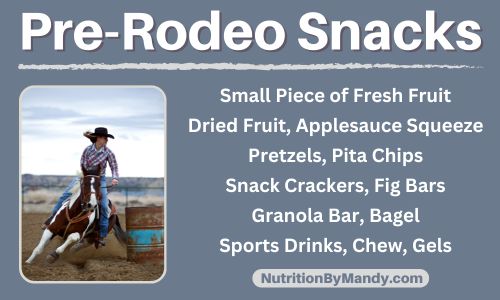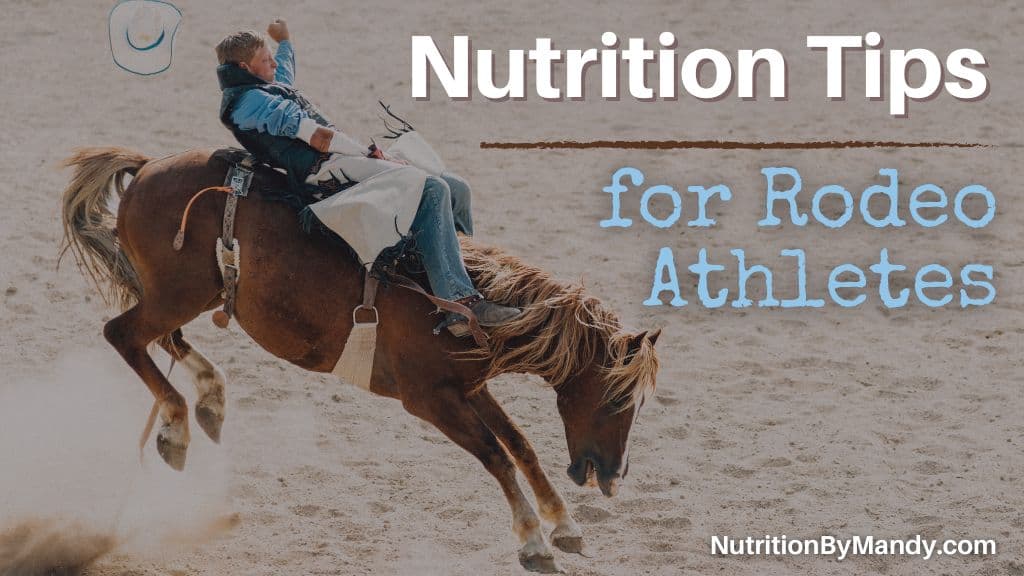Last Updated on April 21, 2025 by Mandy Tyler, M.Ed., RD, CSSD, LD
9 Sports Nutrition Tips for Rodeo Athletes
It is important for rodeo athletes to have a plan in place to support their nutrition needs throughout the course of a demanding rodeo season.
Having worked with professional rodeo athletes, I have seen the challenges they face when traveling the rodeo circuit.
Being equipped with a sports nutrition plan can help ensure that rodeo athletes have the energy needed to train and perform at their best.
#1 Plan Ahead for Travel
Travel is a common reality of rodeo athletes. Throughout the course of the year, rodeo athletes generally will compete in 100+ rodeos and travel 100,000+ miles across the rodeo circuit (1).
Thus, having strategies in place to support a rodeo athlete’s sports nutrition needs on the road is essential.

Pack Snacks for Travel
Before heading out on the trip, I encourage rodeo athletes to pack a variety of healthy snacks they can eat on the drive.
When planning snacks for the road, I encourage rodeo athletes to view snacks as “mini-meals. Balanced snacks can be an important way to help rodeo riders meet their overall sports nutrition needs.
Rodeo athletes can build “mini-meals” by consuming snacks that contain a lean source of protein along with food from at least one other food group.
The chart below shows a variety of ideas for high-protein travel snack combinations.
| Foods Containing Protein | Whole Grains, Fruits, Veggies |
| Beef or turkey jerky | Fresh fruit, dried fruit |
| Greek yogurt | Fruit canned in natural juices, applesauce pouch |
| String cheese, cheese sticks | Whole grain bread, wraps, bagels, crackers |
| Cottage cheese | Pretzels, pita chips, baked chips, rice cakes |
| Hard-boiled eggs | Granola bars, fig bars, breakfast bars |
| Nuts and seeds | Graham and animal crackers |
| Nut butter and seed butter | Dry whole grain breakfast cereal |
| Single serving pouches of tuna or salmon | Baby carrots, cherry tomatoes |
| Deli meat: Turkey, chicken, ham, roast beef | Sliced cucumbers, mini peppers |
| Shredded rotisserie chicken | Sugar snap peas |
| Hummus, low-fat bean dip | Raw broccoli and cauliflower |
| Roasted chickpeas, edamame | Sliced avocado, guacamole |
| Protein bar | Carbohydrate-based sports bar |
Example “mini-meal” snack combinations may include:
- Turkey wrap
- Jerky with pretzels
- Peanut butter and jelly sandwich
- Almonds with apple slices
- Trail mix containing dried fruit, nuts, seeds, pretzels and dry cereal
- Granola bars with nut butter
- String cheese with fig bars
- Hard-boiled eggs with grapes and mixed nuts
#2 Make Healthy Choices at the Gas Station
Since rodeo athletes spend a lot of time on the road, they should be equipped with ideas for the best choices to make at a gas station.
At the gas station, I recommend rodeo athletes steer away from the premade convenience meals such as hot dogs, burritos, and nachos.
Instead, I encourage the rodeo athletes to look for healthier gas station snack options, such as:
- Nuts, seeds, trail mix
- Beef or turkey jerky
- Pretzels, baked chips, snack crackers
- Fruit, dried fruit, applesauce
- Granola bars, breakfast bars, sports bars
- Greek yogurt, cheese sticks, hard-boiled eggs
- Premade deli sandwiches – made with turkey, chicken, ham, or roast beef
Healthy Drink Options at the Gas Station
Hydration is important for a rodeo athlete’s health as well as for sports performance. Even when on the road, it is important for rodeo athletes to make hydration a priority.
Healthy drinks athletes can get at the gas station include:
- Water
- Infused water – Just add a few berries, a lemon wedge, or cucumber slices to your reusable water bottle in the morning
- Unsweetened sparkling water
- Low-fat milk
- 100% fruit or vegetable juice
- Unsweet green tea
- Sports drinks and electrolyte drinks – Consider zero sugar varieties during travel
#3 Travel Nutrition for Rodeo Athletes: Healthy Restaurant Choices
When traveling, rodeo athletes should focus on making healthy choices at restaurants.
General tips for making nutritious choices at restaurants include:
- Be mindful of portion sizes – Avoid super-sizing your meal. It is best to enjoy the meal in moderation and then have a balanced snack later in the day if hungry.
- Limit fried foods – Instead of fried entrées and side items, select menu items that are grilled, roasted, steamed, or baked.
- Choose a healthy side item – Choose items such as side salads, steamed vegetables, apple slices, fruit cups, and yogurt parfaits to eat with the meal.
- Opt for whole grains – When available, choose whole grain bread, buns, and wraps for sandwiches, as well as brown rice for burrito bowls.
- Hydrate right – Choose water, unsweet tea, low-fat milk, or 100% fruit juice over sodas and other sugar-sweetened beverages.
Healthy Restaurant Options for Rodeo Athletes
Below are some of my top healthy selections at popular restaurants.
- Chick-fil-A: Grilled chicken sandwich, Greek yogurt parfait, and a fresh fruit cup
- Chipotle: Chicken or steak burrito bowl made with brown rice, black beans, corn salsa, lettuce, tomatoes, and guacamole
- Mod Pizza: Pizza with ham or chicken, variety of vegetable toppings, side salad
- Wendy’s: Grilled chicken wrap, chili, baked potato
- Jason’s Deli: Modern Mediterranean bowl, fresh fruit cup, chicken noodle soup.
- Subway: Sweet onion chicken teriyaki sub, baked chips
- Panda Express: Broccoli beef, steamed brown rice
- Texas Roadhouse: USDA 6-oz choice sirloin, BBQ grilled chicken, or grilled salmon, baked sweet potato, steamed broccoli, garden salad, and dinner rolls
- Bill Miller’s BBQ: Turkey poor boy sandwich, green beans, beef vegetable soup
My free Healthy Eating Out Guide for Athletes provides additional recommendations for making healthy choices at a variety of types of restaurants.
#4 Fuel Your Rodeo Performance with Nutrition
Similar to putting premium gas into a race car, rodeo athletes should ensure they are putting quality nutrition into their body to train and perform at their best.
In general, the amount and type of food that rodeo athletes should eat before a workout or rodeo competition depends on how much time they have prior to the start of the event.
The more time a rodeo athlete has before the start of the activity, the larger their pre-event meal can be.

Pre-Competition Meals for Rodeo Athletes
When time allows, rodeo athletes should schedule their pre-rodeo meal 3-4 hours prior to the start of activity. This allows time for their bodies to digest the meal and to go to the bathroom, if needed, before the start of the event.
The pre-rodeo meal should include a good source of carbohydrates and a moderate amount of protein. Eating a well-planned pre-rodeo meal can help ensure rodeo athletes go into their event optimally fueled.
Pre-Event Meal Ideas for Rodeo Athletes
Example pre-rodeo meals may include:
- Turkey sub sandwich, pretzels, apple slices
- BBQ turkey breast, baked potato, side salad, cornbread
- Grilled salmon, steamed rice, green beans, dinner rolls
- Chicken fajita tacos, flour tortillas, Spanish rice
- Pasta with marinara, sliced chicken, vegetables, breadsticks
- Grilled chicken sandwich, baked chips, fresh fruit
If eating the pre-event meal from the food provided to the contestants at the rodeo, top choices include:
- Lean brisket, smoked turkey, BBQ chicken
- Sliced bread, sandwich buns, dinner rolls
- Baked potatoes, roasted potatoes, corn
Aim to limit high-fat, greasy meats as well as fried foods with your pre-rodeo meal.
Pre-Competition Snacks for Rodeo Athletes
In the hour or two leading up the rodeo event, athletes should focus on eating snacks high in carbohydrates for a quick source of energy.
Eating food high in protein, fat, or fiber, too close to the start of the activity, may result in an upset stomach during the competition (2).
Pre-Event Snack Ideas for Rodeo Athletes
Ideas for carbohydrate-rich, pre-rodeo snacks include:
- Small piece of fresh fruit
- Dried fruit, applesauce squeeze
- Pretzels, pita chips, snack crackers
- Bagel, fig bar, low-fat granola bar
- Sports drinks, chews, gels
Make sure to pack snacks to take with you to rodeos that you feel comfortable eating prior to competition.
Rodeo athletes want to go into the competition confident they are fueled to perform at their best.

#5 Start the Day with Breakfast
With late nights and frequent travel, too often I find rodeo athletes either skip breakfast or having a morning cup of coffee in place of a full meal.
However, eating breakfast is important for rodeo athletes to fuel the activities of the day ahead.
Breakfast does not have to be a sit-down meal to be beneficial. I find a quick breakfast on-the-go works well for many rodeo athletes.
Simple, healthy breakfasts that rodeo athletes can enjoy in the morning include:
- Whole grain bagel, peanut butter, banana, high-protein milk
- Greek yogurt, frozen berries, granola
- Cottage cheese with fruit, breakfast bars, 100% fruit juice
- Protein overnight oats
- Hardboiled-eggs, English muffin, fresh fruit
- Kodiak Cakes® toaster waffles (contain protein), topped with almond butter and fresh berries, low-fat milk
- Healthy fruit smoothie
#6 Spread Protein Throughout the Day
When working with rodeo athletes, I tend to find that most are eating an adequate amount of protein in their diet.
However, a key sports nutrition strategy, that many are less aware of, is the importance of spreading protein intake throughout the day. Many rodeo athletes tend to consume little protein with breakfast, slightly more at lunch, and then a protein-heavy meal in the evening.
To get the most benefit from protein intake, rodeo athletes should aim to spread their protein intake throughout the day with meals and snacks (3).
In regard to the amount of protein to consume, recommendations for athletes are typically based upon the individual’s body weight. Athletes should aim to consume ~0.25 – 0.3 grams of protein per kg of body weight at each eating occasion (2, 3).
In general, this calculates to be in the range of 25-30 grams of protein at each meal/snack. Athletes should also plan to include protein in their post-workout meal to support their recovery nutrition needs.
#7 Focus on Anti-Inflammatory Foods

With an intense rodeo training and competition schedule it is important for rodeo athletes to include foods in their meal plans that can help reduce inflammation in the body and enhance recovery.
A wide variety of fruits, vegetables, nuts, seeds, and fatty fish, as well as herbs and spices, are all beneficial additions to the diet of rodeo athletes.
Anti-inflammatory foods I recommend rodeo athletes add to their meals and snacks include:
- Berries and cherries
- Fatty fish: Salmon, tuna, mackerel, sardines, and herring
- Dark green leafy vegetables
- Avocados, tomatoes, broccoli, bell peppers, mushrooms
- Nuts: Walnuts, almonds, pistachios
- Seeds: Chia seeds, flaxseeds
- Herbs and spices: Turmeric, ginger, garlic, cinnamon, rosemary, black pepper
#8 Brain Health: Nutrition for Concussions
Given the nature of the sport, rodeo riders are at an increased risk for head injuries, including concussions (1, 4).
Thus, rodeo athletes should be equipped with nutrition strategies to support brain health and recovery from concussions.
When an athlete sustains a concussion there is an increased need for energy and nutrients to support the brain through the recovery process (5).
Protein plays an essential role in supporting tissue healing and repair following an injury (5). If a rodeo athlete sustains a concussion, they should be diligent to ensure they are consuming sufficient protein in the diet to support their recovery needs.
Key Nutrients for Rodeo Athletes Following a Concussion
In addition, the following key nutrients may be beneficial to rodeo athletes following a concussion (5, 6).
- Omega-3 fatty acids: Cold water fatty fish, walnuts, chia seeds, flaxseeds
- Magnesium: Whole grains, green leafy vegetables, nuts, seeds, beans, legumes
- Creatine: Lean red meat, pork, poultry, seafood, dairy products
- Anti-inflammatory fruits, vegetables, herbs, and spices
- Curcumin – found in the spice turmeric
Check out my blog on the best foods for concussions for additional nutrition strategies to promote brain health.
Note: If a rodeo athlete sustains a concussion, the athlete should consult with their physician, athletic trainer, and a sports dietitian nutritionist on a plan specific to their needs.
In addition, athletes should only take dietary supplements under the guidance of their sports medicine team. Excess doses of some nutrients may hinder the recovery process (5).
#9 Limit Alcohol

Finally, rodeo athletes seeking to optimize their performance should limit their consumption of alcohol.
Alcohol contains empty calories (7 calories/gram), which can quickly add up when consumed in excess. In addition, when individuals drink, they tend to be less mindful about the food they eat (2).
For rodeo athletes focused on maintaining a lean body composition, the excess calories from alcohol consumption can be counter to their goals.
I encourage rodeo athletes to be particularly focused on limiting their alcohol intake following a rodeo event. Consuming alcohol following activity may interfere with the recovery process (2, 7).
Rodeo athletes should also be aware that drinking large amounts of alcohol can have negative impacts on performance, which may last for several days (8).
In addition, alcohol is a diuretic, which can lead to dehydration in rodeo athletes (9, 10). Consuming alcohol is also associated with the disruption of sleep, negatively impacting both sleep quality and duration (7).
If rodeo athletes intend to drink, they should do so in moderation. Following an event, rodeo athletes should ensure they have rehydrated and met their recovery nutrition needs prior to drinking alcohol (10).
9 Nutrition Tips for Rodeo Athletes
You are now set with 9 nutrition tips for rodeo athletes. Rodeo athletes should take time to plan ahead to ensure their nutrition needs are met while traveling the rodeo circuit.
For additional sports nutrition tips for rodeo riders, check out my blog on hydration tips for athletes.
Join the Nutrition By Mandy Email List & Get a Free Athlete’s Grocery List
Click HERE to join the Nutrition By Mandy e-mail list. When you join you will receive a free athlete’s grocery list to print and take with you to the store.
About the Author
Mandy Tyler is a Sports Dietitian Nutritionist in the San Antonio, TX area. She is a Registered and Licensed Dietitian, a Board-Certified Specialist in Sports Dietetics, a Licensed Athletic Trainer, and is a Certified Exercise Physiologist through the American College of Sports Medicine. Mandy has experience working with athletes at the high school, collegiate, and professional levels. She believes the key to reaching one’s full potential, both in everyday life and in sports performance, relies on a healthy nutritional foundation.





